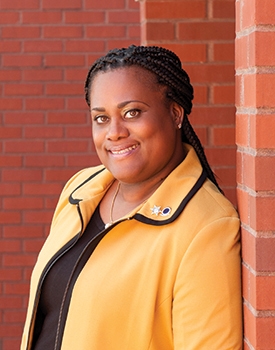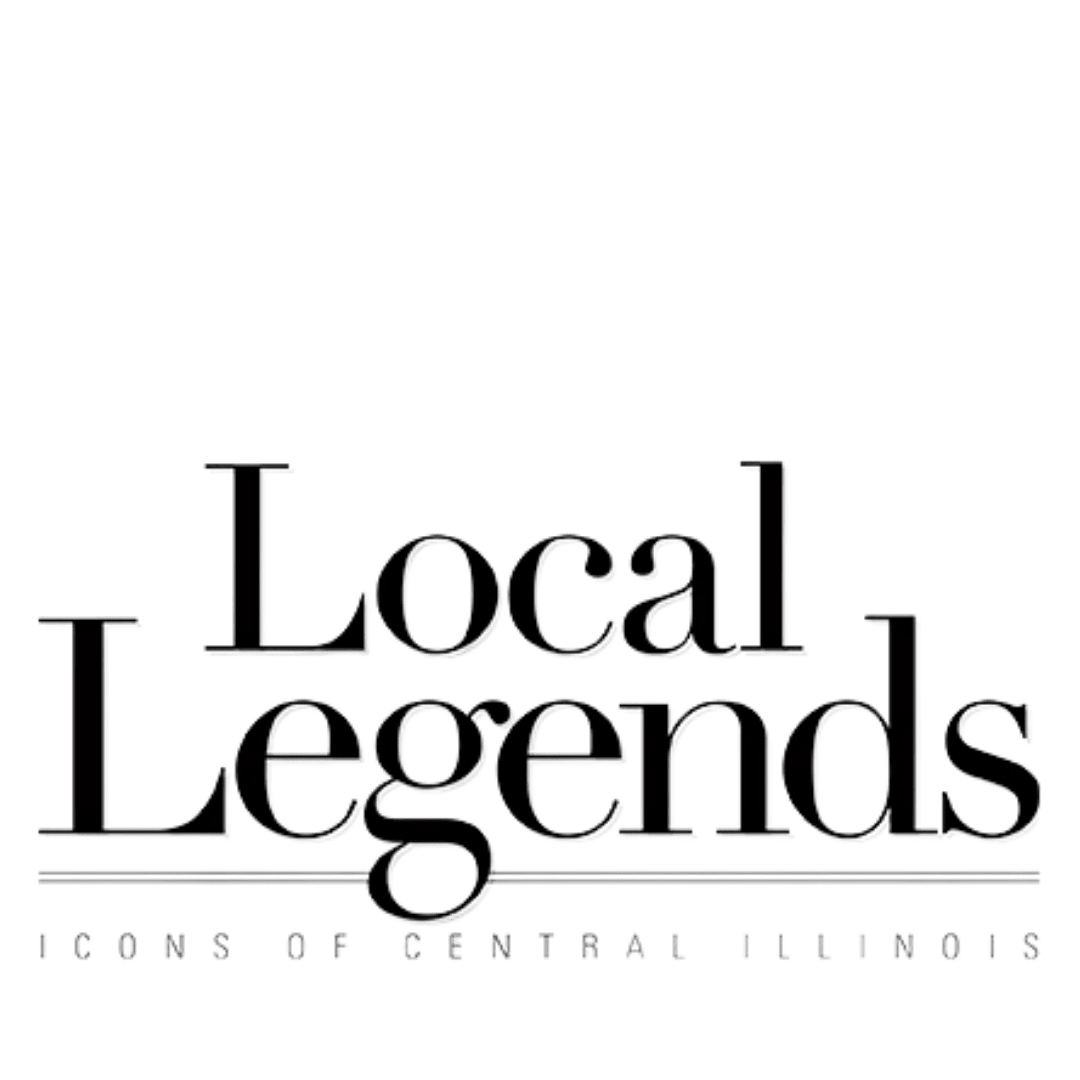A South Peoria native and former resident of Harrison Homes, Ronda Guyton usesher life experiences and community involvement to improve the lives of others. She serves as corrections superintendent in the Peoria County Sheriff’s Office where she oversees the Peoria County Jail—the latest step in her unlikely rise from poverty to a 25-year career in law enforcement. Diagnosed with breast cancer in 2012, she embarked on a new journey to share her story as a survivor and help others livelong, healthy lives. She is active in the community and passionate about helping people through education, employment and advocacy.
Tell us about growing up in Peoria, your family and childhood. Who or what were early influences?
I grew up in the Harrison Homes and got pregnant at age 13. I was a 14-year-old in the eighth grade with a son, living in a single-family household as a single teenage parent. I did not meet my father until I was 13, and I did not see him again until I was 21. He died with us not speaking. As you can imagine, I have faced many challenges: being black, being single, being a young mother, being a woman, and not understanding how education could propel me to the next steps. Statistically, I should not be a “Woman of Influence.” I should still be poor and uneducated. I should be receiving government assistance. I should not have obtained the American dream.
I believe I have a unique authority to speak about overcoming obstacles, leadership, community service and education. Early on I grasped that I was in charge of my dream. Growing up, I was afforded opportunities to benefit from leaders who did not know they were leaders—because it was their lifestyle, not a position. They moved me to dream, set goals, encourage others with a team mentality, and give without the expectation of recognition.
My passion for community service came about from my upbringing. When I left home at 16, someone gave me a place to stay. When I needed diapers for my son, someone gave me diapers or pointed me in the direction of a social service agency that could assist. Good Beginnings was the program that had the biggest impact on my young, impressionable life. They encouraged me to complete grade school. They picked me up every day, dropped my son off at daycare, and took me to Von Steuben Middle School—then repeated the same process after school. Good Beginnings talked to me about college, which seemed unattainable at the time. They showed me pictures of trips staff had taken, which encouraged my love of travel. They cared for me during times when I believed no one else did. They understood that some of my behaviors were based on other factors, which encouraged my compassion for others.
Education has been my saving grace. I continuously want to know more… I want to know the how, what, when and where. I have used my education to build upon my life experiences, to better understand the workings of government and how it affects my community. Education has afforded me opportunities to expand my circle of contacts, which I utilize to connect others for the betterment of our community. I am the American dream, from poverty and the projects to education, employment and advocacy.
Tell us more about your educational path. What sparked your interest in law enforcement?
I have a bachelor’s degree in criminal justice from the University of Illinois Springfield and a certificate in nonprofit management from the University of Illinois Chicago. I have been interested in law enforcement since I was 10 years old. My mother suffers from bipolar schizophrenia, which caused the police to respond to our house a lot. Whenever the police arrived, things always appeared to be better—even for a short period of time. I wanted to be that relief for others. I wanted to bring peace to any situation a person was going through.
 What is a typical day like for you at the Peoria County Jail?
What is a typical day like for you at the Peoria County Jail?
I generally come in around 7:30am, check emails and review incidents (if any) from the night before. I check our daily population count, walk around the jail and make sure everyone is okay, answer questions, and ask officers and supervisors how they are doing or if they need additional resources. A couple times a week, I review current programming and see how that is going, what we can improve on, and what can be added. If I am working on any outstanding programs, I work to get those completed and submitted for approval. Currently the Sheriff and I are working on adding a case management piece to our re-entry program.
What challenges do you face in this role?
My biggest challenge is change. I have lots of ideas, and I have to remember to get advice from the men and women who are working daily in the jail. What I think is a great idea may not be sustainable, or may involve a safety issue, or may not fit into our current programming structure. I am able to let the staff know that my concern is not just for how the detainees are treated, but also that they are important and that I value their input and service.
Tell us about your journey as a breast cancer survivor to becoming an advocate for others facing the same experience.
I was in the process of getting breast augmentation when I was diagnosed with breast cancer, and I felt God was using my vanity against me. I had literally put down my deposit and had my final consultation scheduled. Within 30 minutes of being diagnosed, I reached out to Gayle Young at Susan G. Komen to ask them to take this journey with me.
I wanted to share my story. I wanted women to know all the steps to take upon diagnosis of this disease. I thought about myself—educated, no family history of breast cancer, good health, a non-smoker—yet I did not do the very things that were being suggested: doing a self-breast exam and getting a yearly breast exam. (Had I not wanted breast augmentation, I would not have scheduled a diagnostic mammogram.) If I had done these things, I would have noticed the difference in the breast tissue. I did not know my body like I should have.
I knew that minority women were being diagnosed at later stages and dying at a higher rate than other ethnicities. I wondered who else was not doing exactly what I was not doing, despite knowing better. I saw the need to bring resources, programming, education and support to those who are disproportionately at a higher risk. All of these things led to my love and passion for the Susan G. Komen Memorial Affiliate, collaborations with UnityPoint Health, and forming Living to Serve Foundation, Inc.
Tell us more about Living to Serve Foundation and its mission. What drove you to form your own foundation?
I believe the more information we have, the better chance we have of living a long, healthy life. After I was diagnosed, I realized there were a lot of different services available for women and had a hard time grasping why so many minority women were unaware of these programs and resources. I also recognized that in the minority community we are not very trusting of those who do not look like us or haven’t had the same experiences. This prompted me to start LTSF as a way to close the gap and bridge trusting relationships.
Our mission is to increase awareness of women’s health by providing programming, education and resources. Our annual event is called Sister’s Rock; we bring together healthcare providers with resources and other minority business owners that focus on healing and health. The daylong event also includes breakout sessions, lunch and musical entertainment.
It took me about three months to complete everything, and I had an army of friends that assisted in getting everything done. The biggest challenge was ensuring sustainability. I did not want to do something that would not far exceed my existence and continuously hold true to its foundation.
What is one goal you hope to accomplish in your lifetime?
Own a multi-million-dollar travel company and mentor and grow future leaders.
What inspires you?
People inspire me. I want to be more, give more, and know that God is the reason for all their success.
How do you unwind after a long day of work?
A good wine—specifically a Cabernet Sauvignon.
What is your greatest fear in life? Greatest joy?
My greatest fear is not knowing my assignment (God’s assignment for my life). My greatest joy is the success of others.
Describe your other community involvement. What causes are near and dear to you?
I have way too many passions. I love helping people. I enjoy connecting people. I love knowing that any small contribution I make benefits the community ten-fold—we need each other to grow! I currently sit on the following boards: Susan G. Komen Circle of Promise, Susan G. Komen Walk for the Cure (I was the 31st race chair), American Red Cross and the African American Hall of Fame Museum (I was the keynote speaker last year and will be inducted in February!). I serve on the Livingston Legacy Scholarship Committee and the University of Illinois Alumni Campus Advisory Board. I lend my gifts and talents to other organizations as requested.
How do you maintain a balance between your community work and personal life?
Balance—what is that?! LOL. You only live once, so enjoy! I keep a calendar, and I’ve learned that “no” is a complete sentence. I work on projects that I can realistically complete, delegate and have a strong network. It’s important to be clear about the assignment you will take on when serving on multiple boards.
What is your leadership style or philosophy?
Leadership is a lifestyle, not a position. Treat all people with dignity and respect. Never do anything with the expectation of anything in return. I believe we are here to serve others. Matthew 20:28 details it all.
What is the best piece of advice you’ve ever received?
Once you learn one position, begin to learn the next. When you have a seat at the table, make sure you speak! Do not sit silent, and always be prepared.
What book do you think everyone should read?
Building a Story Brand by Donald Miller. This book is a catch-all for not just entrepreneurs, but for everyday people looking to grow. It makes you think about your purpose and goals and how to connect with people to assist you in reaching those goals. It helps you really think about what you need to be successful. Identify what you love, and care about you!
In your opinion, what is the greatest struggle working women face today?
The greatest struggle is still being “the first woman to do X.” Or having a seat at the table because it looks good, but not being fully respected or heard. Being underestimated after having earned a seat at the table. PM






